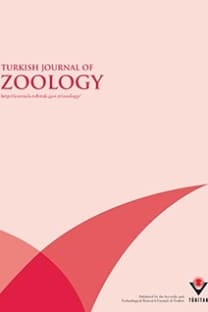KSENIIA KRAVCHENKO, ANTON VLASCHENKO, ALONA PRYLUTSKA, OLENA RODENKO, VITALII HUKOV, VOLODYMYR SHUVAEV
Year-round monitoring of bat records in an urban area: Kharkiv (NE Ukraine), 2013, as a case study
This study presents information about the year-round phenology of bats of temperate zones in a city area for the first time. In total, 967 individuals of 5 bat species (Nyctalus noctula [87.5%], Eptesicus serotinus [10.6%], Pipistrellus kuhlii [0.8%], Vespertilio murinus [0.9%], and Plecotus auritus [0.1%]) were recorded during 2013 in Kharkiv. The population structures of temperate bat species are complex; segregation of sex and age groups varies spatially and seasonally. Most of the bats (88%) were collected during the hibernation period (January-March and November-December) and the autumn invasion (August-mid-September). The breeding period saw a lower number of bats collected, making up 0.5% of records (May-July). The degree of tolerance to urbanization is species-specific. The bats were found indoors (68.6%), between window frames (26.6%), outdoors (2.8%), in basements (1.05%), and on balconies (0.95%). Bats of temperate latitudes inhabit big cities in significantly increasing numbers in winter, spring, and autumn. They avoid urban areas in both the breeding period and the period of fat-store accumulation before hibernation.
Keywords:
Bats, Ukraine, Kharkiv, monitoring, urban ecosystem, bat phenology,
- ISSN: 1300-0179
- Yayın Aralığı: Yılda 6 Sayı
- Yayıncı: TÜBİTAK
Sayıdaki Diğer Makaleler
DAVUT TURAN, FAHRETTİN KÜÇÜK, CÜNEYT KAYA, SALİM SERKAN GÜÇLÜ, YUSUF BEKTAŞ
Fahrettin KÜÇÜK, Davut TURAN, Salim Serkan GÜÇLÜ, Yusuf BEKTAŞ, Cüneyt KAYA
MAR FERRER SUAY, JESUS SELFA, MARIA VICTORIA SECO-FERNANDEZ, JILI PUJADE-VILLAR
Nurcan ÖZYURT, Irmak POLAT, Damla AMUTKAN, Selami CANDAN, Zekiye SULUDERE
A new record and three little-known Eupithecia Curtis species from Turkey (Lepidoptera: Geometridae)
İrmak POLAT, Nurcan ÖZYURT, Damla AMUTKAN, Zekiye SULUDERE, Selami CANDAN
Olegi GORGADZE, Shalva BARJADZE
MAHRAD NASSIRKHANI, REZA VAFAI SHOUSHTARI
